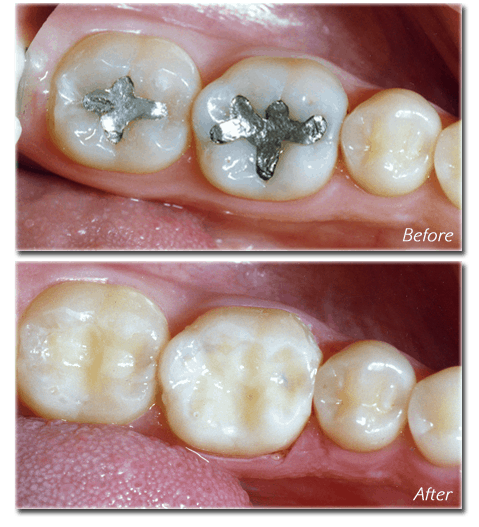
Will Dental Insurance Cover Mercury Filling Removal?
It depends on the exact insurance plan. SMART amalgam mercury filling removal may or may not be covered. The usual situation is the insurance company will pay for regular filling replacement, but not for the extra fees for removing mercury safely. Maryland Holistic Dentist charges an extra fee for the safe amalgam removal as apart of a dental filling replacement fee. The extra “safe removal fee” is certainly not covered by any insurance company. Many dental offices charge a separate fee for safe removal because it is a lot of additional work. And it does take a lot of extra time and materials.

silver fillings safe
Coverage Depends on Specific Insurance Plan
Cost of amalgam filling removal depends on how much your insurance will pay for the procedure. A typical Dental PPO insurance may cover 80% of the cost of the filling removal. Most Insurance plans have an annual maximum benefit such as $1500-$5000 at which point the patient will need to pay for 100% of the fee. Some Insurance plans have a maximum allowable charge and others will pay on a pre-determined fee schedule. At Maryland Holistic Dentist, we have insurance professionals in the office who will contact your insurance company and determine how your insurance works in our dental office and give you a close estimate of costs for your treatment.
What is Amalgam?
Amalgam fillings are made of about 50% mercury and a 50% mix of tin, silver, and copper. Most of us had them placed when we were kids but now with more material options and the fillings breaking down the question is often, “When should I replace my amalgams”. All too often we wait too long and a root canal or extractions are our only options.
Top Five Reasons Why You Should Remove Amalgam Fillings
Your Amalgam Fillings Are Over 10 Years Old
At the ten year the margins on the fillings start to break down leaving a small gap between the filling and the tooth. This area allows leakage and over time decay starts to form. Since amalgams do not bond to the tooth structure but are held in place with retention.
You Have Any Metal Sensitivity Issues.
It is very common to have sensitivity to one or more of the metals that are in amalgam fillings. There are inexpensive lab tests to verify this and determine the ideal material to use with your fillings. There is no safe amount of mercury exposure across the board. Some people cannot tolerate a small amount while other it does not seem to have such an effect. At what point it becomes a problem varies. The one thing we know is that you do not want any exposure if possible. There is also the issue of the battery effect that the metals in your mouth cause.
You Grind Or Clench Your Teeth.
The debate with amalgam fillings starts with the issue of their mercury content. We know that it is released as a vapor when heated. This happens when we drill on amalgam fillings and that is why it is important to take special precautions when having them removed. They are also heated up when we grind on them. Teeth grinding (bruxism) is a common issue and should be considered when replacing your fillings.
Your Fillings Have Become Sensitive.
Amalgams weaken your tooth structure by contracting and expanding with changing temperatures. Heat causes expansion which we see in thermometer. Over the years you develop small cracks around your old fillings till eventually pieces start to come off. At this point crowns, root canals, and extractions are needed. It is better to treat these areas early to avoid larger restorations.
Your Teeth Have Started To Fracture Around Your Fillings.
This can happen and you do not feel a thing. If your fillings are large then it may require a crown to restore the tooth and avoid a root canal or extractions. If the filling covers more than 50% of the chewing surface a crown may be your best option. Especially when the fillings are large if you do not replace then when needed you will eventually need more extensive dental treatment.
Safe Removal of Mercury in Amalgam Fillings is Best
Your best bet is to get an exam from your dentist and make a plan to restore your teeth. Waiting for treatment leads to more costly work, more extensive treatment needs and a higher likelihood you will lose teeth. The materials we have to use for dental work today have great advantages. The material we use are selected with consideration for:
- Biocompatibility
- Safety during placement
- Health impact to the patient
- Safety during removal
- Performance in chewing function
- Appearance
- Longevity
- What if any damage to tooth when the material fails (i.e. does it cause cracks in teeth or destroy the nerve of the tooth)
Contact us today at 301-421-1996 in Burtonsville with any Insurance questions.

 (301) 421 1996
(301) 421 1996 burtonsvillesmiles@gmail.com
burtonsvillesmiles@gmail.com